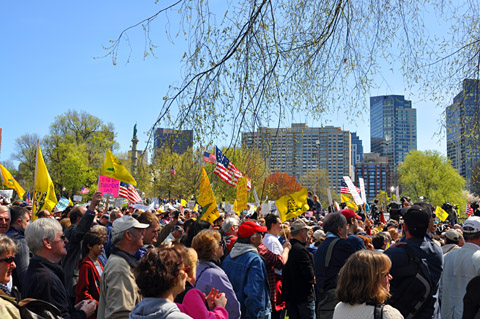It's been four years,
yet I remember it as if it were yesterday — the creation of the
modern Tea Party movement, which gave patriot activists hope after
the disappointing 2008 election.
Before then, the spirit
of the original Boston Tea Party had been kept alive by state/local
taxpayer groups scattered across America, and the National Taxpayers
Union (NTU) and Americans for Tax Reform (ATR) in Washington, D.C.
Along with the traditional tax issues, the national deficit and debt
issue was addressed by the NTU's Balanced Budget Amendment, and
popularized by Ross Perot and his quixotic 1992 presidential
campaign, which became the loosely organized United We Stand
America.
Not since the Silent
Majority elected Ronald Reagan in 1980 (while passing Proposition 2½
here in Massachusetts) had we seen ordinary Americans inspired to
outstanding political action as they were with United We Stand.
My partner, Chip Ford,
was one of its local leaders, as closely as that word applies to
loosely organized groups. He tells a dramatic, sometimes funny, but
ultimately very sad story of how United We Stand fell down amidst
internal wrangling and the loss of its focus.
So he and I watched
with a mixture of excitement and trepidation the rise of the Tea
Party movement, happily associating ourselves with these kindred
spirits while fearfully awaiting the first internal battle. After a
year went by with the Tea Party growing and then another year that
brought it unprecedented success in the midterm elections, we
started to believe that this time things would be different.
It still amazes me that
Tea Party leaders — again, if the word "leader" applies — held it
together as long as they did. As executive director of Citizens for
Limited Taxation (CLT), I'd spent my share of patriotic holidays
tossing boxes of tea into Boston Harbor; now I watched with delight
as two bright, energetic young women, Corie Whalen and Christen
Varley, organized the Greater Boston Tea Party (GBTP) and held the
first Patriots Day rally on Boston Common in 2009.
CLT's associate
director, Chip Faulkner, spoke there and at other Tea Party rallies
in Worcester and Lowell that day.
One year later, the two
Chips and I were in Boston for
the GBTP rally with Sarah Palin; last year, Chip Faulkner was
there to hear Tim Pawlenty speak. Chip Ford and I attended rallies
on the North Shore. Good times, a chance to see old friends and make
new ones. But we're no longer comfortable with our
social-conservative local tea party.
|
|
 |
| |
2010
Greater Boston Tea Party Rally
with Sarah Palin
Photo by Chip Ford |
Faulkner will be
speaking at the 2012 rally, which this year is being held in
Worcester from 2 to 4 p.m. at 1 Lincoln Square
[map] on Sunday, April 15, thereby inspiring the theme
"Tax Day Tea Party, Turn the Tide" — referring to the coming
election with its related issues of the economy, taxes and the
national debt. Other expected speakers are philosophy professor
Andrew Bernstein, author of "Capitalist Solutions — a Philosophy of
American Moral Dilemmas"; Mary-Alice Perdichizzi, representing a new
generation with the Brandeis Tea Party; and Aaron Goldstein,
American Spectator contributor.
Unfortunately, the
founding Greater Boston Tea Party won't be holding its annual rally
on Boston Common; that event was hijacked by social conservatives
who disagree with the Tea Party's singular focus on fiscal issues
and want to use it to advance their own agenda. By getting a city
permit before the GBTP could finalize theirs, the "other Tea Party,"
or what I call the Kool-Aid Party, forced the fiscal conservatives
to celebrate Patriots Day elsewhere.
Corie Whalen is now in
Houston, serving as South Central Regional Director of Young
Americans for Liberty. Christen Varley is presently with her family
in Ohio, though she is still on the GBTP Board; she recently told me
"there are people like us all over the country filling in the ranks
of activists and local pols who are climbing the ladder and
learning. Instead of thinking, 'This is the year we have to win,' I
like to think, 'this is just the beginning of our winning streak.'"
Her successor at GBTP
is another early organizer, Christine Morabito, who is also involved
with the Merrimack Valley Tea Party. She and MVTP/CLT activist Ted
Tripp will be in Worcester on Sunday. He and Faulkner will be
reminding the crowd that as it pays its taxes on April 17 this year,
it will also be celebrating Tax Freedom Day — the day that,
according to the Washington-based Tax Foundation, the nation's
taxpayers will have paid for government at all levels and will now
be working for themselves (though in Massachusetts we will be
working to cover our higher state and local tax burden until April
22).
They'll also note that
in 1904, when Justice Oliver Wendell Holmes described taxes as "the
price we pay for a civilized society," there was no federal income
tax, and Tax Freedom Day was Jan. 21. The national debt, now almost
$16 trillion, was $26 billion.
America badly needs the
Tea Party to help restore civilization; I hope its fiscal
conservatives can prevail campaigning on the fiscal issues on which
most Americans can agree come this November.